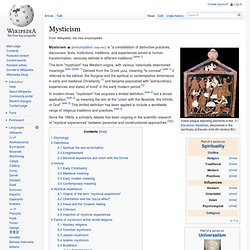

Religious children are meaner than their secular counterparts, study finds. Children from religious families are less kind and more punitive than those from non-religious households, according to a new study.
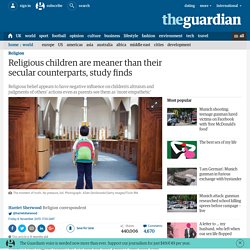
Academics from seven universities across the world studied Christian, Muslim and non-religious children to test the relationship between religion and morality. They found that religious belief is a negative influence on children’s altruism. “More generally, they call into question whether religion is vital for moral development, supporting the idea that secularisation of moral discourse will not reduce human kindness – in fact, it will do just the opposite.” Atheist Jews: Judaism Without God. By Kimberly Winston Religion News Service BERKELEY, Calif.
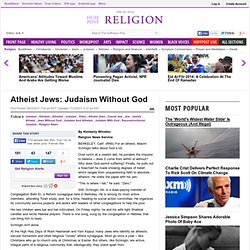
(RNS) For an atheist, Maxim Schrogin talks about God a lot. Over lunch at a Jewish deli, he ponders the impulse to believe -- does it come from within or without? Why does God permit suffering? Finally, he pulls out a flowchart he made showing degrees of belief, which ranges from unquestioning faith to absolute atheism. "This is where I fall," he said. Still, Schrogin, 64, is a dues-paying member of Congregation Beth El, a Reform synagogue here in Berkeley. His two children were bar and bat mitzvahed.
Schrogin isn't alone. At the High Holy Days of Rosh Hashanah and Yom Kippur, many Jews who identify as atheists, secular humanists and other religious "nones" attend synagogue. Religion of Humanity. Positivist temple in Porto Alegre Religion of Humanity (fr.
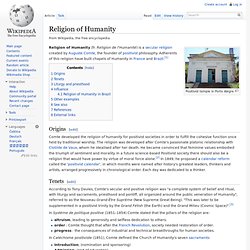
Religion de l'Humanité) is a secular religion created by Auguste Comte, the founder of positivist philosophy. Adherents of this religion have built chapels of Humanity in France and Brazil.[1] Origins[edit] Comte developed the religion of humanity for positivist societies in order to fulfill the cohesive function once held by traditional worship. Tenets[edit] According to Tony Davies, Comte's secular and positive religion was "a complete system of belief and ritual, with liturgy and sacraments, priesthood and pontiff, all organized around the public veneration of Humanity", referred to as the Nouveau Grand-Être Suprême (New Supreme Great Being).
Yuga. Yuga (Devanāgari: युग) in Hindu philosophy is the name of an epoch or era within a four age cycle.

According to Hindu cosmology, life in the universe is created and destroyed once every 4.1 to 8.2 billion years,[1][2] which is one full day (day and night) for Brahma. The lifetime of a Brahma himself may be between 40 billion and 311 trillion years.[1] The cycles are said to repeat like the seasons, waxing and waning within a greater time-cycle of the creation and destruction of the universe. Like Summer, Spring, Winter and Autumn, each yuga involves stages or gradual changes which the earth and the consciousness of mankind goes through as a whole.
A complete yuga cycle from a high Golden Age, called the Satya Yuga to a Dark Age, Kali Yuga and back again is said to be caused by the solar system's motion around another star.[3] Glossolalia. Icon depicting apostles & the Theotokos filled with the Holy Spirit (notice fire symbol above their heads.)
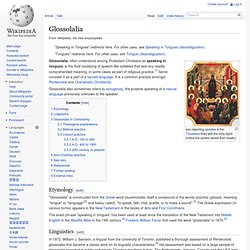
Glossolalia, often understood among Protestant Christians as speaking in tongues, is the fluid vocalizing of speech-like syllables that lack any readily comprehended meaning, in some cases as part of religious practice.[1] Some consider it as a part of a sacred language. It is a common practice amongst Pentecostal and Charismatic Christianity. Glossolalia also sometimes refers to xenoglossy, the putative speaking of a natural language previously unknown to the speaker.
Etymology[edit] "Glossolalia" is constructed from the Greek word γλωσσολαλία, itself a compound of the words γλῶσσα (glossa), meaning "tongue" or "language"[2] and λαλέω (laleō), "to speak, talk, chat, prattle, or to make a sound".[3] The Greek expression (in various forms) appears in the New Testament in the books of Acts and First Corinthians. Linguistics[edit] In 1972, William J. Glossolalia in Christianity[edit] Bishop's Storehouses - Mormonism, The Mormon Church, Beliefs, & Religion - MormonWiki. From MormonWiki Inside a Bishop's Storehouse run by the Mormon Church Since the early days of The Church of Jesus Christ of Latter-day Saints in the 1800's, Bishop's Storehouses have been a part of the Church.

However, up until the 1930's, these storehouses were maintained at the local congregational level only. In 1936, the Church announced what is now known as the Church Welfare Program, which is a worldwide program within the Mormon Church. This program includes the program known as Bishop's Storehouses. A Bishop's Storehouse is best described as a supermarket without the cash registers. In 2007 there were 108 Bishop's Storehouses in the United States and Canada. Where do the items come from that fill a Bishop's Storehouse? How is the food transported from the farms to processing centers and canning? How are Bishop's Storehouses financed? Numinous. Rudolf Otto[edit] Otto's use of the term as referring to a characteristic of religious experience was influential among certain religious intellectuals of the subsequent generation.
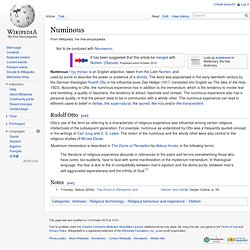
For example, numinous as understood by Otto was a frequently quoted concept in the writings of Carl Jung and C. S. Lewis. Mysticism. Votive plaque depicting elements of the Eleusinian Mysteries, discovered in the sanctuary at Eleusis (mid-4th century BC) Mysticism (
